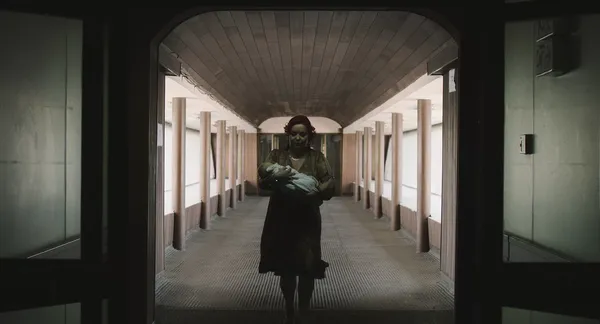Eye For Film >> Movies >> Have You Seen This Woman? (2022) Film Review
Have You Seen This Woman?
Reviewed by: Nikola Jovic

If something can’t be spoken of, then it must be shown. But what if it can’t even be shown? The puzzles posed by the film's title, as well as the film itself, are effortlessly engrossing and enjoyable but as such, although intoxicating, the film at times feels like it got too high on its own supply. Have You Seen This Woman (2022) is a directorial feature debut by Dusan Zorić & Matija Gluščević, that had its premiere last summer during the Critics’ week at the Venice film festival, from where it walked away with a special “artists under forty” prize for the film’s editor, Olga Kosarić. After having its run at Cottbus and Bilbao, the film had its national premiere at the 28th Belgrade Auteur Film Festival, where it won the “Aleksandar Saša Petrović” Grand Prix Award.
The film starts on the construction site, as we’re slowly moving inside an ash-pink socialist residential building where we’re greeted by a TV News Announcer (Vladimir Jelić) who gives us a tour of the apartment in the process of renovation, while setting up the framing device of the anthology triptych we’re about to watch. For the remainder of the film we’ll follow three women by the name of Draginja, all three played poignantly by Ksenija Marinković. Whether we’re seeing Draginja as a vacuum cleaner saleswoman witnessing a suicide, or as a healthcare professional stealing a baby from a maternity clinic so she can parade the child to her judgy family as her own, or as a down-and-out (perhaps mentally ill) woman trying to escape a possessive relationship with her old parents — there is a clear throughline connecting them. All three Draginjas are either looking for some sort of enjoyment and agency within the society that, on one hand, puts a lot of pressure on them, but on the other refuses to acknowledge their existence.
Trying to piece together an impression of the film, one feels compelled to do its mystery justice by engaging with its ambiguous nature, which makes the experience of seeing the film sound like it’s some sort of pretentious chore when it really isn’t. Before you even make an effort in denoting vague images it, first of all, needs to be entertaining, and here Have You Seen This Woman delivers. Ksenija Marinković’s offhandedly charming and effortlessly comical performance makes for some of the best acting in a Serbian film last year, and the supporting cast are giving her a run for her money, eliciting a wide range of emotional responses out of the audience, from laugh-out-louds to quiet bewilderment.
This uncomfortable comedic touch with an undercurrent of sadness creeping in is punctuated through slow creeping zoom-ins, a visual style that ranges from extremely grounded to lensbaby distorted and overlong holding onto the scenery way after all the action has played out (courtesy of ). Although it holds where the most would cut, it’s also funny just due to Draginja being put into situations where you can’t really picture her. An image of a middle-aged woman, in her ragged cleaning outfit and worn-out slippers, raving while on ecstasy, isn’t exactly what one has in mind when you imagine a typical night out. The initial feeling is one of laughter and enjoyment, but the enjoyment soon becomes overbearing to the point of discomfort. The camera easily shifts from alienating and distant to gorging, putting everyone’s libidinal excesses under a magnifying glass.
Much could be said of its shifts, not just of the shifts from comedic to dark, but from grounded to fantastical. The character of the TV Announcer, played by Vladimir Jelić, who plays a film version of himself, introduces us to the film in a sort of way like we used to be greeted by Boris Karlof at the beginning of a horror anthologies. While the figures like Karlof, Hitchcock (Alfred Hitchcock Presents), and the likes, imply the atmosphere of fear and suspense, seeing on the film screen someone like Jelić who we’re used to seeing exclusively on the RTS 1 (Radio & Television of Serbia) — a tv channel whose proud slogan declares: “for your right to see everything” — in a way implies a sense of realism, with an uncanny comedic twist to it. These horrors are not macabre in nature, they’re the horrors of trying to be seen in a world where you’re as noticeable as old paper tiles slowly unpeeling from the walls. Invisible in plain sight.
The mixing of fiction and reality, as well as a lot of aesthetic choices, make for an interesting echo of the Yugoslav Black Wave aesthetic. Even the images of the rubble of a city being torn down and degrading, feel like a distant echo of the post-war Belgrade in Makavejev’s films. The times keep changing, but for ordinary people like Draginja, their lives are always playing out against the backdrop of chaos.
All three Draginjas put themselves in unusual situations of their own making, all in the search for some sort of a break in the steamy overheating train of everyday life. But even though they’re striving for that enjoyment, they know it’s of their own making, they know it’s fake. Spectators may have ‘the right to see’ — like the previously mentioned slogan says, but as Draginja fades into nonexistence (sometimes literally) — it doesn’t mean that the subject will be seen. Which, funny enough, can be said of the film's subject as a whole.
Although the film intrigues us from the start, one can’t but get the impression that the cryptic storytelling is spread out unevenly, by the middle of the final story the visual motifs become so vague - echoing the feelings of such films as Inland Empire (2006) and Antichrist (2009) — only to reveal by the end that the puzzle was maybe no puzzle at all. Like being teased by threats of a big hand in a game of poker, only for them to fold, denying us the satisfaction of finding out what cards they were holding. Whether it’s deliberately playing hard-to-get, or if it’s playing close to the chest because going through the ride is more captivating (in a true Lynchian style) than the solution of the puzzle itself — one can’t deny its bold and daring nature. As such, Have You Seen This Woman makes for a confident and bold first feature out of a very promising young directing duo.
Reviewed on: 30 Jan 2023
















